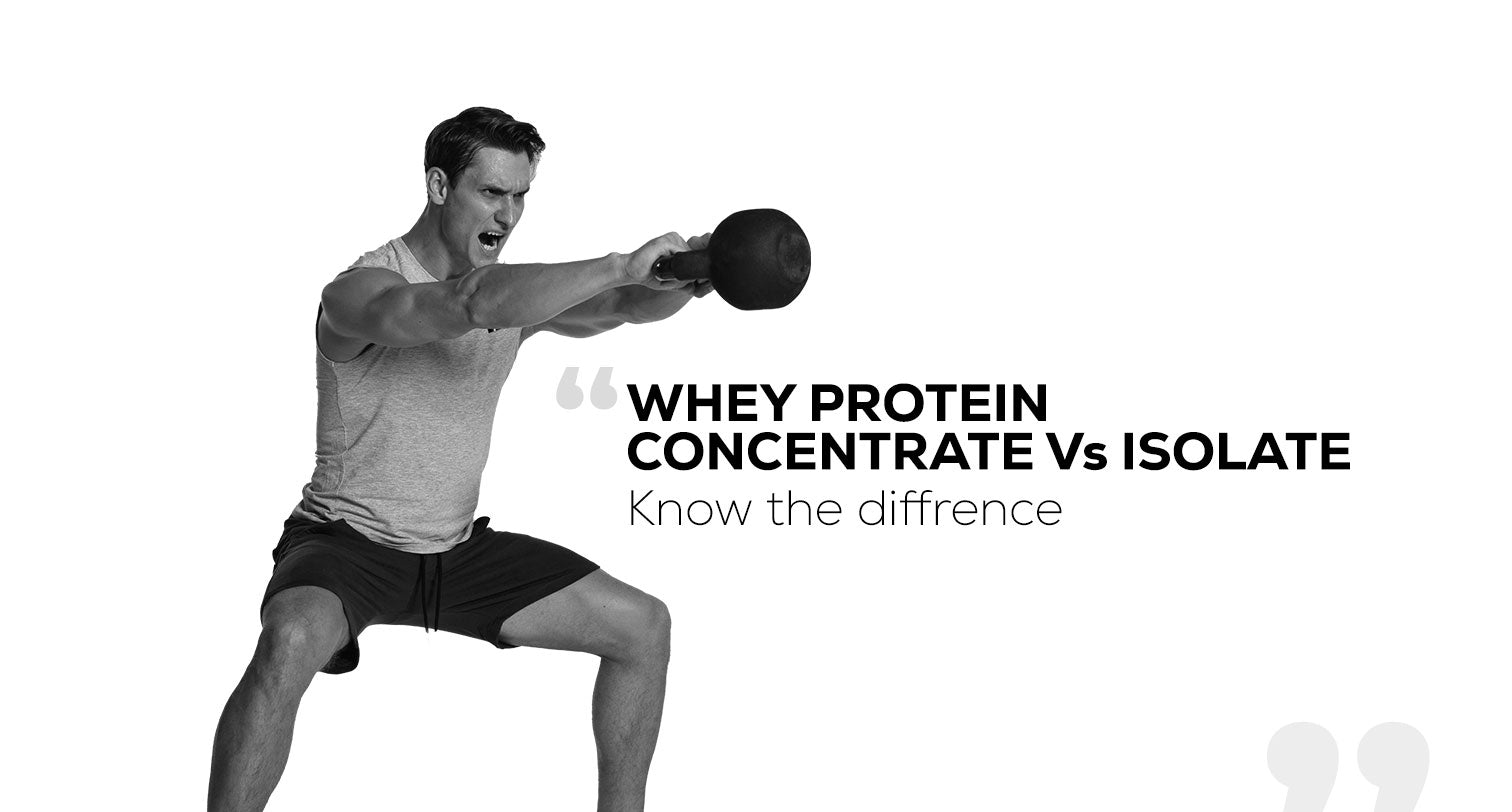What Is Whey Protein?
When it comes to protein supplements, whey protein stands tall as one of the most popular choices among fitness enthusiasts and athletes alike. Derived from milk during the cheese-making process, whey protein offers a convenient and effective way to meet your daily protein requirements. However, within the realm of whey protein, there are two main forms that often create confusion: whey protein concentrate and whey protein isolate.
In this article, we will dive deep into the world of whey protein, exploring the differences between whey protein concentrate and isolate. By the end, you'll have a comprehensive understanding of these protein variants, helping you make an informed choice based on your fitness goals and dietary needs.
Whey Protein Concentrate Vs Isolate: Difference In Origin And Nutrient Content
Whey protein concentrate is the less processed form of whey protein. It is obtained by filtering the liquid whey and removing some non-protein elements. This form of whey protein typically contains around 70-80% protein content, with the remaining portion consisting of lactose, fat, and various bioactive compounds naturally present in milk. On the other hand, whey protein isolate undergoes additional processing steps to remove a more significant amount of lactose, fat, and other non-protein components. This results in a higher protein content of approximately 90%.
Whey Protein Concentrate Vs Isolate: Difference In Target Audience
Whey protein concentrate and isolate cater to different segments of the population based on their specific nutritional requirements and fitness goals. Whey protein concentrate, with its slightly lower protein content, is often favored by individuals who are looking for a cost-effective protein supplement that still provides valuable nutrients. It is a suitable choice for those seeking to maintain or build muscle mass while considering their budget.
On the other hand, whey protein isolate appeals to individuals who prioritize a higher protein content and desire a supplement with minimal lactose and fat. Athletes, bodybuilders, and individuals following strict dietary plans often choose whey protein isolate to support their muscle recovery and growth without unnecessary calories or carbohydrates.
Whey Protein Concentrate Vs Isolate: Difference In Benefits
Both whey protein concentrate and whey protein isolate offer numerous benefits to support overall health and fitness. Let's explore the benefits associated with each form:
Benefits of Whey Protein Concentrate:
- Rich Nutrient Profile: Whey protein concentrate contains various bioactive compounds, including immunoglobulins and lactoferrin, which support immune function and overall well-being.
- Cost-Effective: Compared to whey protein isolate, whey protein concentrate is often more affordable, making it an economical choice for individuals seeking to supplement their protein intake.
- Satiety and Digestibility: The presence of lactose and fat in whey protein concentrate can promote a feeling of fullness and aid in digestion.
Benefits of Whey Protein Isolate:
- High Protein Content: Whey protein isolate offers a significantly higher protein content, which is beneficial for individuals looking to maximize their protein intake without additional carbohydrates or fats.
- Low Lactose and Fat: The additional processing steps in whey protein isolate remove a substantial amount of lactose and fat, making it an ideal option for those with lactose intolerance or those aiming for a low-fat diet.
- Fast Absorption: Whey protein isolate is known for its rapid absorption rate, delivering amino acids to the muscles quickly and aiding in muscle recovery and growth.
The Health Benefits of Whey Protein Isolate
In addition to the aforementioned benefits, whey protein isolate provides specific advantages due to its high protein content and minimal lactose and fat content. Some of the health benefits of whey protein isolate include:
- Muscle Building: The high protein content in whey protein isolate supports muscle protein synthesis, facilitating muscle repair and growth after exercise.
- Weight Management: Protein has a satiating effect, and consuming whey protein isolate can help control appetite, reduce calorie intake, and support weight loss or weight maintenance efforts.
- Improved Recovery: The rapid absorption and rich amino acid profile of whey protein isolate promote quicker muscle recovery, reducing muscle soreness and fatigue after intense workouts.
- Enhanced Immune Function: The bioactive compounds in whey protein isolate, such as immunoglobulins, contribute to a strengthened immune system, protecting against infections and promoting overall health.
Whey Protein Concentrate Vs Isolate: Difference In Side Effects
While whey protein concentrate and isolate are generally safe for consumption, it's important to be aware of potential side effects and consider individual sensitivities or allergies. Common side effects associated with whey protein supplements may include:
- Digestive Issues: Some individuals may experience bloating, gas, or gastrointestinal discomfort due to lactose intolerance or sensitivity to whey protein.
- Allergic Reactions: Whey protein is derived from milk, and individuals with milk allergies may experience allergic reactions such as hives, itching, or difficulty breathing.
- Kidney Strain: Excessive consumption of protein, including whey protein, can potentially strain the kidneys in individuals with pre-existing kidney conditions. It is advisable to consult a healthcare professional before significantly increasing protein intake.
What’s Your Fitness Goal? Make an Informed Choice Between Whey Protein Concentrate And Isolate!
With the detailed insights provided on Whey Protein Concentrate Vs. Isolate, you can now make an informed decision based on your fitness goals. There's no need to worry about obtaining pure whey protein isolate or concentrate when you have HealthFarm Nutrition by your side. HealthFarm ensures the best and purest whey protein powder available.
If you're looking for an isolate, you may consider Nitro Fusion Whey Isolate Protein. It contains 24 grams of isolate whey protein fortified with Digzyme, a multi-enzyme blend. Another option is the Signature Whey Protein Isolate, which provides 24g of protein per 32g serving.
For those interested in concentrate, Raw Whey (Unflavoured) Whey Protein Concentrate is a suitable choice. It contains 24 grams of protein without any added sugar or flavours.
Ready to level up your fitness game? Look no further and put your trust in HealthFarm!

